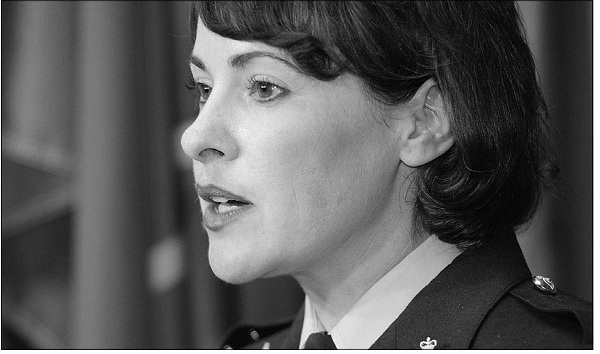Former police spokeswoman
claims sexual harassment
Face of RCMP on Pickton, Air India files on sick leave
after 16 years of alleged torment; one officer
blackmailed her into sex, she says
Gordon Hoekstra, Vancouver Sun, Nov. 10, 2011
RCMP Cpl Catherine Galliford, who has been on sick leave for four years,
says a supervisor on the Missing Women Task Force exposed himself to her.
Photo: Glenn Baglo, Vancouver Sun.
A former high-profile RCMP spokeswoman says she suffered from years of sexual harassment on the job, which resulted in post-traumatic stress disorder.
Cpl. Catherine Galliford was often the public face of the RCMP between 2001 and 2007. Her cases included the Willie Pickton serial murder case and the Air India bombing prosecution.
Galliford, who has been on sick leave for the past four years, said the sexual harassment took place during most of her 16-year career.
In April, Galliford provided information on the alleged harassment incidents in a more-than-four-hour interview with the RCMP.
The 115-page transcript of her statement, which Galliford provided to The Vancouver Sun through her lawyer Barry Carter, alleges that a supervisor on the Missing Women Task Force told colleagues they were intimate and once exposed himself to her.
She also alleges that a supervisor with the Air India Task Force took her on unnecessary trips on the pretext of sharing information with victims’ families. She said the trips were a ruse to get her out of town and attempt to have sex with her.
She said she finally got to a point where she broke.
“[Some bosses] were using their position of authority to try to get in my pants [have sex with me],” Galliford said in an interview on Tuesday.
“I could not get away from harassment,” she said.
Galliford also recounted in her April interview with the RCMP that she was sexually harassed by an RCMP officer even before she entered the force.
She was accepted to the force in late 1990, and started her training in early 1991. At that time, an RCMP member she came into contact with began stalking her, she stated.
She alleged the officer told her he would prevent her from getting onto the force if she did not have sex with him. So she did.
“So, that was the start of my lovely career,” Galliford said in an interview.
Galliford added she has battled with alcohol and chemical dependency as a result of her workplace stress. She said she has also developed a fear of RCMP buildings, and is afraid to leave her home sometimes. She said she has no desire to return to the RCMP.
The interview transcript provided to The Sun included only Galliford’s statement. Comments or questions from the senior RCMP officers and her lawyer had been removed.
Carter, her lawyer, noted it is not a sworn statement, but simply a transcript of the information she provided to the RCMP. He said he could not remember whether the April interview was a result of the RCMP’s or Galliford’s initiative.
Her statement — at times rambling — does not focus solely on her allegations of sexual harassment. It also offers an accounting of her career and her take on internal office politics. Several times she singles out RCMP members she says she hates.
Galliford also tells of the effects of the alleged sexual harassment.
Shortly before she had a breakdown — ending up in the Bellwood addiction treatment centre — she said she couldn’t sleep if she didn’t drink.
When she stopped drinking, she had to take over-the-counter pills to stay awake.
Michael Webster, a police psychologist who knows Galliford, said he is not surprised by the former police spokeswoman’s story.
“Catherine showed great courage here in stepping out and wanting to share her story with the public. There are other Catherines who suffer in silence,” said Webster, who has 35 years experience as a psychologist working with police members.
The psychologist knows Galliford through a free support group he offers to RCMP members who have conflicts with their employer.
Webster said he does not believe the rate of sexual harassment is greater in the RCMP than other police forces.
However, women who face sexual harassment in municipal police forces can take complaints to their union, Webster noted.
Since the RCMP is not unionized, that is not an option for women like Galliford, he said.
The outcome is that you get people on indefinite sick leave for years, called “off-duty sick” in the RCMP, noted Webster.
The RCMP did not respond directly to Galliford’s allegations, but the police force issued a statement saying harassment is not tolerated.
“While we cannot speak to specific allegations, we continue to encourage our members to report incidents of harassment when they occur so they can be investigated immediately,” it stated.
The police force also said it is concerned with the health and welfare of its officers, noting officers may be involved in traumatic incidents not typical for an average citizen.
In British Columbia, there are 225 RCMP members on off-duty sick leave, or just under four per cent of the force. Of those, 48 — or less than one per cent — are off for psychological reasons related to some form of workplace conflict, according to the RCMP.
Those include allegations of harassment, conflict about feedback on performance, personality conflicts, frustration about lack of promotion or transfer, and workload and shifting issues.
Go to Meet the New Boss: Commissioner Bob Paulson won’t fix the RCMP
Go to News and Comment page
